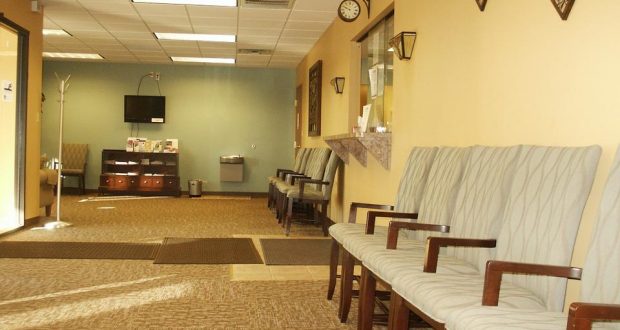By: Guest Author
Published: December 8, 2016
Contributed by by Brooke Faulkner- Guest Contributor
Scene: A woman sits in the waiting room of a women’s health clinic.
The chairs are dusty pink with overly shellacked armrests. She tries to rest her elbow on the armrest but it slides right off.
People in medical get-ups bustle around her – suits, scrubs, and white coats – all very busy with whatever they’re doing. She picks at her nail polish. She’s got nothing to be nervous about, she’s just there for her annual exam, but still she’s never felt very comfortable in doctor’s offices.
Enter: A nurse practitioner. She’s wearing pink scrubs. She raises an iPad to her face and in a squeaky voice calls out, “Susan!”
It’s not the name our heroine was hoping to hear (her own, of course). She studies Pink’s posture – slightly hunched at the shoulders, like she’s spent years of her life in a classroom.
She wonders just how long a nurse has to go to school to specialize in women’s health. And what exactly does she do day in and day out? In the midst of this thought, a woman in a pantsuit with a hospital name tag approaches the desk and starts asking the receptionist about records.
She wonders what on earth Pantsuit is doing in the clinic. What’s her job? How long did she have to go to school?
Why wonder? We have all the answers here at our fingertips.
In 2002, the North American Menopause Society (NAMS) developed a competency examination which awards all passing, licensed healthcare providers the credential of NAMS Certified Menopause Practitioner. If you’re looking for menopause-specific consultation, finding a practitioner with the NCMP credential assures the highest level of education and awareness in current menopause treatment. Here are some of the medical professionals you’re likely to encounter at an annual check-up, along with their education requirements, and whether or not they are NCMP eligible.
Women’s Healthcare Administrator
This is perhaps the least understood of all the healthcare professionals. This is due, in part, to the fact that the work of a health admin spans such a vast number of administrative healthcare careers, from hospital CEO to women’s assisted living administrator. We’ll take a little extra time on this one, for that reason.
A health admin is more than a suit. They are the organizational backbone of every hospital or private clinic you’ve ever visited.
An administrator’s job is to make sure the facility runs smoothly. This obviously ranges quite a bit depending upon the environment – hospital, private practice, or nursing facility, for example – but will generally involve aspects of budgeting, community outreach, recruiting, and personnel management. They can be some of the most outspoken advocates for women’s health.
A healthcare administrator does not have a medical degree, so they are not licensed to give official medical advice about managing menopause or other women’s health concerns. But. An administrator knows the system inside and out, and will likely be able to direct you to the best resources possible.
Education: 4 years for a Bachelor’s degree, 2+ years for a Master’s of Science in Health Administration (MSHA). Not NCMP eligible.
Obstetrician / Gynecologist
The Ob/Gyn is the most recognizable women’s healthcare professional. They have studied both Obstetrics – concerning a mother’s health during pregnancy – and Gynecology – the overall health of a woman’s reproductive systems.
An Ob/Gyn is a licensed physician who can be a great resource for menopause advice. If you’re not quite ready to go to your Ob/Gyn with menopause questions, there are many working on behalf of Red Hot Mamas who are happy to answer your questions.
Education:
4 years Bachelor’s degree, 4 years Medical degree, 4 years Ob/Gyn Residency. NCMP eligible.
Nurse Practitioner
If the health administrator is the backbone of a medical office, the Nurse Practitioner is its hands, arms, and legs. An NP is a Registered Nurse with an advanced degree and training.
Nurse practitioners can often work completely independently of a physician in diagnosing and treating women’s health concerns. They can prescribe age-specific therapies, perform minor procedures, and counsel patients about preventative measures.
Education: 4 years Bachelor’s of Science in Nursing (BSN), 1-2 years RN Licensure, 2 years Master of Science in Nursing (MSN). NCMP eligible.
Decoding Credentials
There are a lot of abbreviations and acronyms in medical credentials. If your brain is starting to feel like alphabet soup, this cheat sheet from NAMS can be a handy reference.
● MD = physician
● DO = osteopathic physician
● ND and NMD = naturopathic physician
● PA = physician assistant
● DNP, NP, ANP, ARNP, CRNP, and FNP = nurse practitioners
● DNPs = Doctors of Nursing Practice;
● CNM = nurse midwives
● RPh and PharmD = pharmacists
● APRN, RN, RNC, BSN, and MSN = nurses
● LCSW and MSW = social workers
● PhD = a doctorate degree, such as in psychology, among others
● NCMP = special competency demonstrated in the field of menopause
No matter the political policies or popular opinion of the day, the world needs healthcare professionals who are dedicated to women’s health. Through thick and thin.
The more aware every one of us – patient, family-member, or waiting room aficionado – can have about the world of women’s health, the better equipped we will be to advocate for the health of our daughters, sisters, mothers, and ourselves in the coming years.
No more wondering.
The views expressed herein this article, written by a guest contributor, do not necessarily represent those of the Red Hot Mamas organization. The content is for informational purposes and should not substitute the advice of your doctor.
 Red Hot Mamas In Charge of Change.
Red Hot Mamas In Charge of Change.

